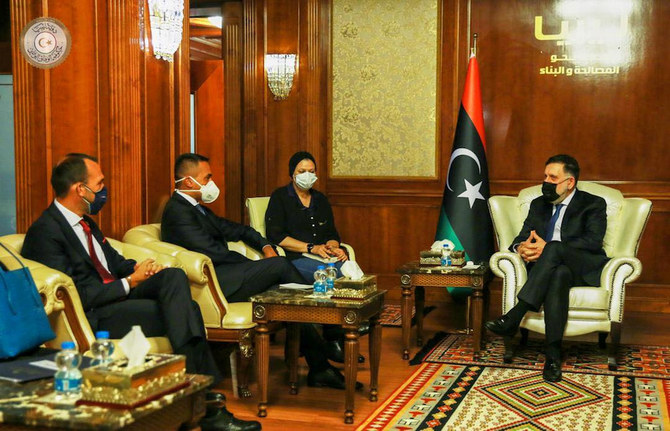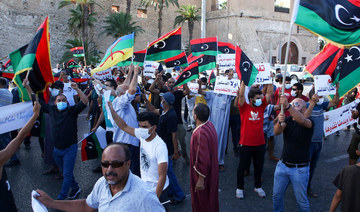TRIPOLI: The EU’s foreign policy chief held talks with Libya’s UN recognized government on Tuesday to push for renewed efforts to resolve the country’s long-running conflict.
Josep Borrell met the head of the Tripoli-based Government of National Accord, Fayez Al-Sarraj, whose administration recently announced a truce after months of hostilities with troops loyal to eastern strongman Khalifa Haftar.
“#Libya remains top priority for EU. We welcome recent cease-fire understanding, and continue to support dialogue and Libyan-led political resolution to conflict,” Borrell tweeted after the meeting.
Haftar launched an offensive to seize Tripoli in April 2019, but was beaten back by pro-GNA forces. Fighting has stalled around the central Mediterranean port of Sirte, the gateway to Libya’s eastern oil fields and export terminals.
The GNA and Aguila Saleh, speaker of the eastern-based parliament that partly backs Haftar, in late August made separate announcements that they would cease all hostilities and hold nationwide elections, drawing praise from world powers.
Discussed ways forward to advance political process, to return to 5+5 military committee talks, and to lift oil blockade.
EU strongly supports Berlin process, mediation efforts and deescalation measures, including arms embargo - key elements to bring Libyan conflict to an end. pic.twitter.com/nCFGH4ksb1
— Josep Borrell Fontelles (@JosepBorrellF) September 1, 2020
“EU strongly supports Berlin process, mediation efforts and deescalation measures, including arms embargo — key elements to bring Libyan conflict to an end,” Borrell tweeted.
He was referring to a January summit in the German capital where the main countries involved in the Libyan conflict agreed to respect an arms embargo and to stop interfering in Libya’s domestic affairs.
Borrell said he had also discussed ways “to advance (the) political process,” revive joint military talks between the two sides and to lift an oil blockade imposed since January by pro-Haftar groups demanding a fair share of hydrocarbon revenues.
The EU diplomat later on Tuesday met the head of the National Oil Corporation Mustafa Sanalla, and tweeted that they had discussed the “need to ensure that oil production can resume, for the benefit of all Libyans and for the unity and prosperity of #Libya.”
Meeting with Libyan National Oil Corporation Chairman Sanalla.
Discussed need to ensure that oil production can resume, for the benefit of all Libyans and for the unity and prosperity of #Libya. pic.twitter.com/vKdimQ45AY
— Josep Borrell Fontelles (@JosepBorrellF) September 1, 2020
Haftar last month authorized a partial lifting of the months-long blockade of oil terminals to help ease power cuts in the east, according to a military official loyal to him.
The north African country, which sits on the continent’s biggest crude reserves, has been mired in a complex web of conflicts since the 2011 NATO-backed uprising that toppled and later killed longtime dictator Muammar Qaddafi.
Also on Tuesday, Al-Sarraj met Italian Foreign Minister Luigi Di Maio to discuss ways to implement the points of agreement announced in Saleh’s statement, to achieve a permanent cease-fire and disarmament in Sirte and Al-Jufra and to lift the closure on oil regions.
The two sides agreed that the political process should get underway.
They also called for oil sites to be reopened, "as the delay causes more suffering for all Libyans, and more losses, which have so far amounted to about $10 billion,” the GNA said in a statement on Facebook.
The talks also included economic cooperation and enabling Italian companies to resume work on stalled projects and implement new projects to boost the Libyan economy, open job opportunities and revitalize the various sectors.
The Italian minister then headed to eastern Libya to meet with Saleh, speaker of the rival Tobruk-based House of Representatives, Libyan officials said.
Libya’s National Oil Corporation (NOC) Chairman Mustafa Sanalla also met Di Maio in Tripoli on Tuesday as they discussed the blockade of oil facilities in Libya, NOC said on its Facebook page.
NOC said Di Maio “affirmed his full support for the initiative proposed by the corporation to resume production and export of oil, and freeze its revenues in the corporation’s account in the Libyan Foreign Bank, in parallel with the launch of an economic path that ensures the achievement of financial transparency.”
Haftar is supported by Egypt and the United Arab Emirates as well as Russia, while the GNA is backed by Turkey and Qatar.
(With AFP and Reuters)




























